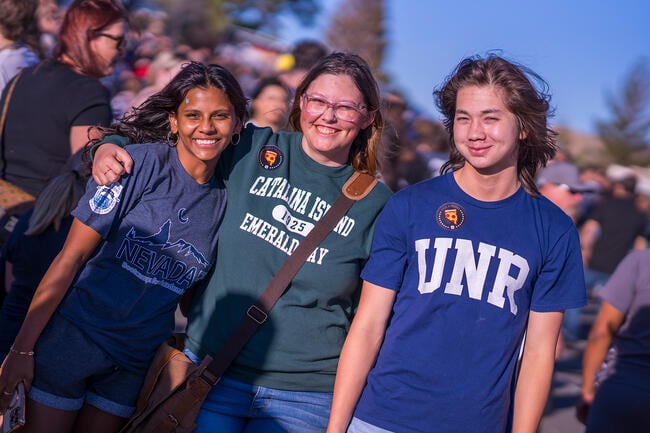You have /5 articles left.
Sign up for a free account or log in.

The University of Nevada, Reno, created a weeklong onboarding experience to help students navigate class and academic resources before their first day of school.
University of Nevada, Reno
College readiness is on the decline among incoming traditional-aged students, creating new challenges for colleges and universities to support student retention and completion. Research from EAB and Seramount found a growing number of students struggle to meet expectations in the classroom, including keeping pace with rigorous courses or engaging with faculty members.
One way to address college readiness is to equip students with resources and insights into navigating college prior to the start of classes.
The University of Nevada, Reno, gets ahead of challenges for incoming students through a one-week precollege program that introduces learners to various support resources, peer mentors and college-level courses. The initiative, NevadaFIT, has contributed to higher retention rates among first-year and transfer students, minimizing obstacles that may appear later in the term.
The setup: UNR’s program is modeled on Biology Intensive Orientation for Students at Louisiana State University, which was designed to create a sense of belonging and academic fit among incoming College of Science students. Previously, NevadaFIT was only required for biology students, but since 2021, it has become a campuswide initiative.
NevadaFIT lasts one week and starts with students moving into their residential housing. Participants are grouped into two categories, first organized by academic department (called a Camp) and then into a small group of students and a peer mentor (called a Pack).
UNR has 11 NevadaFIT Camps, aligning with each of the colleges, plus one for students who have yet to determine their major. Each Camp has a unique schedule, requiring different events for their participants. Undecided students can opt in to a Camp that interests them or remain with other exploratory learners.
A student’s Pack is determined by their college, often organized by major. For example, all students in the College of Business will participate in the BizFIT Camp, but marketing students will find themselves in a Pack of their major peers.
Each Pack includes a peer mentor, typically a UNR undergraduate or graduate student who has already completed NevadaFIT, to provide insights and guidance regarding personal life, academics or navigating campus.
How it works: NevadaFIT bears some similarities to an orientation week, but the way students engage with campus and their peers makes the program distinct, staff said.
During traditional orientation, students may be placed in a math class, receive information about academic support offices and get their housing placement.
At NevadaFIT, learners attend daily classes, participate in study sessions and learn to navigate campus spaces, such as the fitness center.
“It gives a chance for students to find the resources that they’re interested in and learn more about them and how to use them,” said Tiffany Elsner, assistant director of NevadaFIT. “Those students are then more likely to either be accessing that resource in the future or getting the information that’s most pertinent to them.”
All students are enrolled in a one-credit class as part of the experience. Credit is awarded based on students’ attendance and participation in various events and workshops.
An interesting characteristic of the program is that most participants are enrolled in a math course—BizFIT students attend economics lessons, for example—which gives them a head start on content and offers a low-stakes way to gauge academic readiness.
“They can completely bomb the homework, which hopefully they don’t,” said NevadaFIT director Brianne Chambers. “Even if they don’t pass the exam at the end of the week, they don’t fail NevadaFIT.”
Behind the scenes: NevadaFIT is a massive undertaking for the university, requiring a full-time director and assistant director to coordinate each year.
In addition to working alongside campus partners—including academic departments, the registrar’s office, support offices and housing and dining services to deliver the one-week intensive—staff also teach a make-up course for students who can’t participate in the one-week intensive, such as student athletes, which runs throughout their first term.
NevadaFIT also employs hundreds of student employees to serve as Pack mentors each fall, screening student applications and training hired mentors for compliance with FERPA and sexual harassment laws.
At the end of the event, Elsner leads data collection and analysis, helping to organize student feedback and evaluations to guide future development of the program.
The impact: Program analysis indicates NevadaFIT has played a role in improving students’ retention, engagement and academic performance at UNR.
Data from a 2024 pre-assessment and exit survey found that the number of students saying they felt very confident or confident going into their first semester at UNR grew 15 percentage points after they completed NevadaFIT.
“The change in students is definitely palpable,” Chambers said. “The first couple of days, you see like they’re all stiff and walking around a little bit unsure and very separate, and it’s so fun to see the campus at the end of the week of NevadaFIT. They’re hugging and they’re excited.”
Two-thirds of students who hadn’t yet identified a major pick one by the end of the week, which could be due in part to exposure to the major and interactions with their fellow students, Elsner said.
Additionally, students who participated in NevadaFIT have 5 to 10 percent higher retention rates for their second year, compared to their peers who didn’t participate.
Get more content like this directly to your inbox. Subscribe here.




